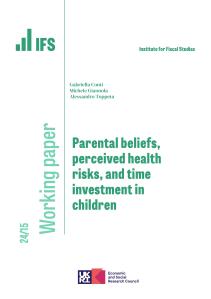COVID-19 has uprooted many aspects of parents’ daily routines, from their jobs to their childcare arrangements. In this paper, we provide a novel description of how parents in England living in two-parent opposite-gender families are spending their time under lockdown. We find that mothers’ paid work has taken a larger hit than that of fathers’, on both the extensive and intensive margins. We find that mothers are spending substantially longer in childcare and housework than their partners and that they are spending a larger fraction of their paid work hours having to juggle work and childcare. Gender differences in the allocation of domestic work cannot be straightforwardly explained by gender differences in employment rates or earnings. Very large gender asymmetries emerge when one partner has stopped working for pay during the crisis: mothers who have stopped working for pay do far more domestic work than fathers in the equivalent situation do.
Authors

Deputy Research Director
Monica is a Deputy Research Director and Professor of Economics at the University of Bristol, with an interest in Labour, Family and Public Economics.

Associate Director
Sarah is an Associate Director in the Education and Skills sector at the IFS, holding a British Academy Postdoctoral Fellowship.

Research Fellow
Alison is a Senior Research Economist of our Institute with research interests in the economics of gender, marriage and education.

Deputy Research Director
Sonya Krutikova is an Associate Professor of Economics at Manchester University and IFS Deputy Research Director.

Associate Director
Christine's research examines inequalities in children's education and health, especially in the early education and childcare sector.

Angus Phimister

Lucy Kraftman

Almudena Sevilla
Journal article details
- Publisher
- IZA Institute of Labor Economics
- Issue
- July 2020
Suggested citation
Andrew, A et al. (2020). 'The gendered division of paid and domestic work under lockdown' (2020)
More from IFS
Understand this issue

Sure Start achieved its aims, then we threw it away
15 April 2024

If you can’t see it, you can’t be it: role models influence female junior doctors’ choice of medical specialty
24 April 2024

A mess has been made of Child Benefit, and the clear-up operation may not be easy
29 March 2024
Policy analysis

What you need to know about the new childcare entitlements
28 March 2024

The short- and medium-term impacts of Sure Start on educational outcomes
9 April 2024

Sure Start greatly improved disadvantaged children’s GCSE results
9 April 2024
Academic research

Imagine your life at 25: Gender conformity and later-life outcomes
24 April 2024

A senior doctor like me: Gender match and occupational choice
24 April 2024

Parental beliefs, perceived health risks, and time investment in children
15 April 2024